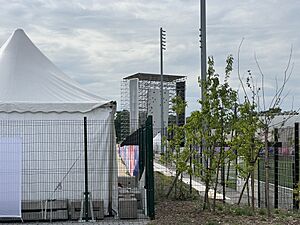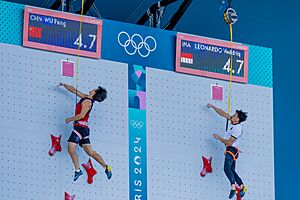Sport climbing at the 2024 Summer Olympics facts for kids
Quick facts for kids Competition climbingat the Games of the Olympiad
|
|
|---|---|
 |
|
| Venue | Le Bourget Sport Climbing Venue |
| Dates | 5–10 August 2024 |
| No. of events | 4 (2 men, 2 women) |
| Competitors | 68 |
Competition climbing is an exciting sport. It involves athletes climbing tall walls. At the 2024 Summer Olympics in Paris, competition climbing took place from August 5 to 10. The event was held at the Le Bourget Sport Climbing Venue. This was the second time climbing was part of the Olympics. It first appeared in Tokyo 2020.
For the Paris 2024 Games, the climbing competition changed. There are now four medal events instead of two. This is because the "boulder-and-lead" event was separated from the "speed" event. Also, more climbers competed. The number of athletes grew from 40 to 68.
Contents
Where the Climbing Happened
The climbing competitions were held at the Le Bourget Sport Climbing Venue. This venue is in Le Bourget, a suburb near Paris. It is one of two new sports places built just for the Paris 2024 Games. The other new place is the aquatic center in Saint-Denis.
How the Competition Works
When climbing first joined the Olympics in 2020, it had one "combined" event. This meant athletes competed in three types of climbing: bouldering, lead, and speed. Their scores from all three were multiplied together. Many athletes did not like this system. They felt it was unfair because speed climbing is very different from bouldering and lead climbing.
For the Paris 2024 Olympics, things changed. The International Olympic Committee decided to have four medal events. There are two main types of climbing, each for men and women:
- Boulder-and-lead combined
- Speed climbing
Speed Climbing
Speed climbing is now its own event. In this event, two climbers race side-by-side. They climb a 15-meter (about 49 feet) wall. The goal is to reach the top as fast as possible. It's a thrilling race to see who is quickest!
Boulder-and-Lead Combined
The boulder-and-lead combined event is different from speed climbing. It tests a climber's strength, skill, and strategy. For Paris 2024, the scoring system for this event was updated. Now, climbers earn points for their performance in both bouldering and lead climbing. The athlete with the most points wins.
Here is how the scoring works:
- An athlete can earn a maximum of 200 points in total.
- Bouldering: This part is worth up to 100 points.
- There are four different climbing problems (routes). Each problem is worth up to 25 points.
- Climbers get 5 points for reaching the first "zone" hold.
- They get 10 points for reaching the second "zone" hold.
- They get the full 25 points for reaching the "top" hold.
- If a climber tries to reach a scoring hold but fails, 0.1 points are taken away for each failed try.
- Lead Climbing: This part is also worth up to 100 points.
- Climbers get 100 points if they reach the very top of the route and clip their rope.
- Points are given for the last 40 moves of the route.
- The last 10 moves (closest to the top) are worth 4 points each.
- The next 10 moves are worth 3 points each.
- The next 10 moves are worth 2 points each.
- The first 10 moves (of the final 40) are worth 1 point each.
- Moves below these final 40 do not earn any points.
This new scoring system was first tested in 2022. It was used at events in Barcelona, Munich, and Morioka.
How Climbers Qualified
A total of 68 spots were available for climbers at Paris 2024. This is a big increase from the 40 spots in Tokyo 2020. There were 28 spots for speed climbing and 40 for boulder-and-lead combined. Each country could send a maximum of four climbers. This meant two men and two women, with two in each climbing type.
The qualification process started at the 2023 IFSC Climbing World Championships. This event was held in Bern, Switzerland. The top climbers there earned the first spots. After that, climbers could qualify at special events on each continent. These events took place in Africa, the Americas, Asia, Europe, and Oceania. More chances to qualify were available at Olympic Qualifier Series events in 2024.
Because France is the host country, they automatically got a spot for one French climber of each gender in each event. This is only if they did not already have a qualified athlete. Also, four more spots were saved for countries that usually do not send many athletes to the Olympics. This is called the Universality rule.
Competition Schedule
| B | Boulder semifinal | L | Lead semifinal | Q | Qualification | F | Final |
| Event ↓ / Date → | Mon 5 Aug 24 | Tue 6 Aug 24 | Wed 7 Aug 24 | Thu 8 Aug 24 | Fri 9 Aug 24 | Sat 10 Aug 24 |
|---|---|---|---|---|---|---|
| Men's combined | B | L | F | |||
| Men's speed | Q | F | ||||
| Women's combined | B | L | F | |||
| Women's speed | Q | F |
Medal Winners
Medal Table
* Host nation (France)
| Rank | NOC | Gold | Silver | Bronze | Total |
|---|---|---|---|---|---|
| 1 | 1 | 0 | 1 | 2 | |
| 2 | 1 | 0 | 0 | 1 | |
| 1 | 0 | 0 | 1 | ||
| 1 | 0 | 0 | 1 | ||
| 5 | 0 | 2 | 0 | 2 | |
| 6 | 0 | 1 | 1 | 2 | |
| 7 | 0 | 1 | 0 | 1 | |
| 8 | 0 | 0 | 2 | 2 | |
| Totals (8 entries) | 4 | 4 | 4 | 12 | |
Medalists
| Event | Gold | Silver | Bronze | |||
|---|---|---|---|---|---|---|
| Men's combined |
Toby Roberts |
Sorato Anraku |
Jakob Schubert |
|||
| Men's speed |
Veddriq Leonardo |
Wu Peng |
Sam Watson |
|||
| Women's combined |
Janja Garnbret |
Brooke Raboutou |
Jessica Pilz |
|||
| Women's speed |
Aleksandra Mirosław |
Deng Lijuan |
Aleksandra Kałucka |
|||
New Records Set
Some amazing new records were set during the climbing events!
| Event | Round | Climber | Nation | Time | Date | Record |
|---|---|---|---|---|---|---|
| Women's speed (speed) | Qualification | Aleksandra Mirosław | 6.06 | 5 August | WR | |
| Men's speed (speed) | Bronze medal match | Sam Watson | 4.74 | 8 August | WR |
See also
 In Spanish: Escalada en los Juegos Olímpicos de París 2024 para niños
In Spanish: Escalada en los Juegos Olímpicos de París 2024 para niños
- Sport climbing at the 2023 Pan American Games
 | George Robert Carruthers |
 | Patricia Bath |
 | Jan Ernst Matzeliger |
 | Alexander Miles |



